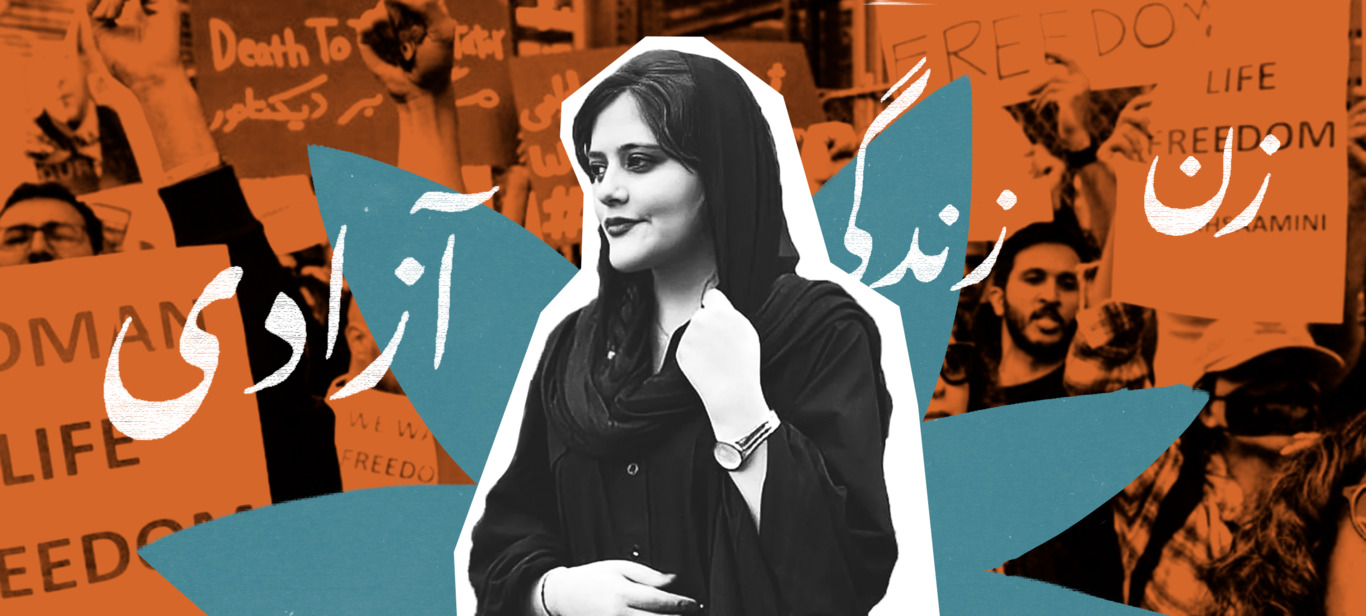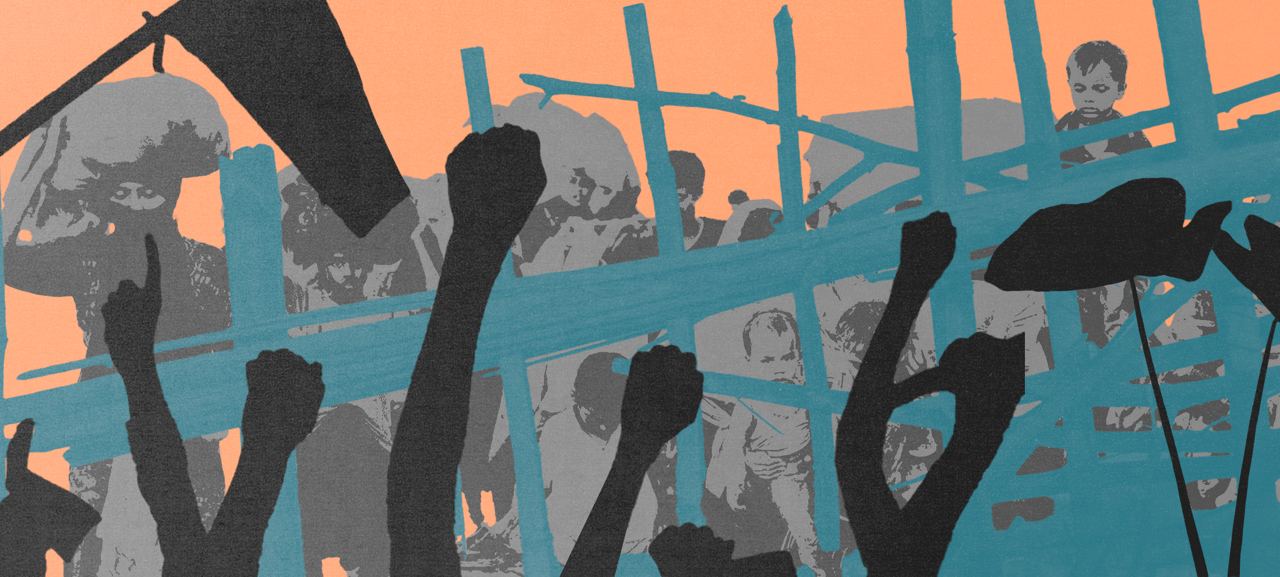Following a year of struggles and war, and to mark the one-year anniversary of the feminist uprising in Iran, a group of feminists united in the Transnational Feminist Assembly located in France initiated the following manifesto, published in several languages. The Transnational Feminist Assembly is a feminist self-education network that aims to contribute to the creation of a concrete transnational network of mutual aid. It was born of the desire to build solidarity with Iranian revolutionary feminist movements, and to fight against the imperialist, racist recuperation of feminism. As a pro-choice feminist movement, it defends equality and inclusivity in all forms, and supports all those who are attacked because they cross the boundaries of gender, nation and morality. It is non-partisan, even if some of its members are active in parties, associations, collectives, unions or other movements, such as the organization of solidarity with the Ukrainian resistance Ukraine CombArt. Coordinated by some twenty people, it tends to operate horizontally, with decisions based on mutual agreement. The central aim of the Transnational Feminist Assembly is to create a forum for sharing ideas and experiences that transcends the borders that fragment territories. To strengthen the links that already connect those engaged in struggles around the world and inhabit, as feminists, these spaces of revolutionary resistance over the long term.
Cruelty as a mode of controlling bodies, and particularly the bodies of gendered and racialized people, lies at the heart of the capitalist extractivist machine. It is its language. And that's why feminism is fundamentally revolutionary, and carries within it the political struggles of all those exploited and minoritized by labor, issues of sexism, racism and validism. It is impossible to separate anti-patriarchal struggles from struggles against wage precarization and the colonial political order of the world. The West, draped in its deceptive universalist principles, has self-determined itself as the center and benchmark, based on subjective indicators that ensure its superiority, condemning the world, through a movement of negation of the multiple cultures, political systems and peoples that make it up, to be not the world, but "the rest" of the world. In this sense, the terms North/South support a violent ideology that feeds the idea of a geographical division of the world, whereas the common denominator of what has been called "the South" is precisely not the delimitation of a geographical space, but the fact that they have been and continue to be denied, colonized and exploited by "the North".
The phenomenon of neo-colonialism and the struggle against it are not limited to the relationship between the West and its former colonies. The current military collaboration between Russia and Iran is serving the oppressive and colonial politics of both States. While Iran has been actively supporting the Russian invasion of Ukraine by its sales of drones and missiles, Russia has also been backing the Islamic Republic by providing its government with the arms and funds needed to continue its internal repression and its regional military interventions. And yet, in the ashes of a Soviet empire that crumbled and is trying to rise again in Russia, we see the example of a people who refuses to align its actions on predictions: that Kyiv would fall in a few days in February 2022, for example. This way of putting oneself deeply at stake, out of a refusal of voluntary servitude, shows us that hope is a practice: we don't have to look for good reasons to hope. We regularly try to understand what's happening in Ukraine, in Iran, by asking ourselves whether winning the war seems militarily plausible, whether overthrowing the regime seems feasible – and whether, therefore, we have a reason to be optimistic. What we do, then, is assess the chances of victory beforehand, to find out whether we can remotely put our hope in the balance of these struggles. Whether it's worth it. But the courage of the Ukrainians and Iranians shows that hope doesn't work that way – and that's not even what it's for. It's a political practice. Putting hope in its place in relation to the facts, and to the understanding we can have of them, seems to be one of the keys to what we call courage. The history of Iranian society shows that courage is not a virtue that one possesses or does not possess: it is a relationship to the course of events, to action, and an economy of values and emotions that is transformed over time. It is shaped, gained or lost in intensity through events experienced collectively. To stop asking ourselves whether it's reasonable to believe in a revolution in Iran, or in a Ukrainian victory over Russia, means to change our relationship to hope – to accept it as what it actually is for Ukrainians and Iranians: a form of life and resistance, that liberates the question of courage – for everyone.
This manifesto has already collected over 800 signatures, 112 of which from various organizations all over the world. It is still open to individual and collective signatures. To sign, click here.
Foreword by the International Feminist Assembly for the publication of a statement in "Commons"
For Sepideh Gholian, Iranian journalist specializing in labor law, defender of the trade union movement, incarcerated since 2018. Since her imprisonment, she has been covering the situation of women in prison through letters and testimonies. An activist in the Woman Life Freedom movement, she was reincarcerated four hours after her release, and has been detained again since 2023. Her courage and determination inspire feminists over the world. They are a reminder of the coordinates of the struggle and the level at which resistance now lies.
On 16 September 2022, Jina Mahsa Amini, a young Kurdish woman aged 22, was killed in Tehran by the morality police. This murder was the starting point for an uprising that shook Iran and the world. Starting in Kurdistan, the cry of "Women, Life, Freedom" swept the Iranian street in an insurrectionary and vital movement, global and protean, which asked for nothing and required everything.
As the months went by and in the face of bloody repression, the uprising continued to evolve, giving rise to an unprecedented network of concrete forms of solidarity: spontaneous demonstrations organised by neighbourhood, neighbours leaving their doors open to allow demonstrators to escape, night-time demonstrations outside prisons to oppose executions, shopkeepers' strikes, a unified communique? from the trade unions[1] demanding both decent working conditions and an end to ecocidal policies, nuclear armament and the privatisation of natural areas, as well as political equality for women, ethnic and national minorities and LGBTQIA+ people – who are also "spearheading the revolution"[2].
The Iranian feminist revolution is a total revolution. The issue is not whether or not to wear the headscarf: that – it cannot be repeated often enough in the context of Islamophobia in de West – is for women to decide for themselves. What is at stake in the compulsory veil in Iran is the State's visible control of all bodies and their subjugation with the aim, for a minority, of monopolising resources. The Islamic Republic governs through gender apartheid and state racism. It can only survive through the unbridled deployment of policing tailored to the racial coordinates of the populations it seeks to subjugate. All these techniques infuse the global colonial economy. All lives are not equal: this reality was brought once more to the fore in France in June 2023 by the murder of Nahel and the bloody repression of the uprisings that followed. We find it on every scale, from the Mediterranean coasts, which push-back practices have turned into mass graves, to the working-class neighbourhoods of Europe, Mayotte and Guyana, as well as those of Brazil, Sudan, Palestine, Lebanon, Afghanistan and Iran.
The core of the feminism we defend is the fight against this continuum of violence and dehumanization at work in capitalism. As long as we do not assert our voice, feminism will remain spoken of, monopolized for the benefit of a discourse that legitimizes this order. This has been the case over the past year: the Western powers at the time had nothing but admiration for the "courage of Iranian women", while rolling out the red carpet for a liberal, Islamophobic and transphobic[3] feminism, which was careful to separate the struggle for women's rights from the struggle against all the oppressions challenged by the revolutionary uprisings in Iran. Today, these same Western governments are taking advantage of the destabilisation of the Islamic Republic by the Iranian street in their international power games, while abandoning the latter to alarming waves of executions, arrests and torture. It has never been clearer that the emancipation of peoples is a non-issue on the international stage. That's why feminist silence is not an option, and ignorance is not an excuse.
While the paths of revolution cannot be decreed, it is nonetheless essential to exchange the knowledge and know-how of local resistance, to maintain networks of concrete solidarity, and to weave the fabric of a people mobilised on a global scale. There is an urgent need to learn from the endurance and modalities of the "Women, Life and Liberty" movement, and to support our Iranian comrades in the face of repression. Because what we have to deal with are here as there, in different ways, state apparatuses in the hands of radicalised fringes of the bourgeoisie, whose rhetoric, whether religious or secular, increasingly poorly conceals a similar and competing project to capture wealth and exploit all living things. Today, having gone through a year of social struggle, we activists from different organisations linked by anti- capitalist feminist concerns know how exhausting the struggle is in the current balance of power. This exhaustion is an integral part of the techniques of government against the people. We are collectively thrown into climate chaos, our futures mortgaged by catastrophes, our present suffocated by stress, repression, racial profiling, our bodies exhausted by work, poverty, illegality, lack of care and consideration. It has never been clearer to us that the security rhetoric we are fed on a daily basis by the media owned by a reactionary oligarchy is really about the security of golf courses. Security for capital until the world crumbles.
This observation should not make us lose sight of the fact that it is not only necessary but possible to organize our forces and change the course of events. It's a tight turn, not easy, but doable. And we begin by affirming that this turn consists, from our position, in urgently bringing European feminism out of denial, in confronting and combating its colonial history head-on, and in orienting our practices towards transnational solidarity and reflection. The Iranian revolution is not just about opposing the Islamic Republic's mortifying policies, it is also a blueprint for a post-capitalist society based on solidarity and emancipation. It is a lesson of movement, of political and theoretical reinvention, and that's why the fight of the Iranian people is the fight of feminists and bodies in struggle the world over. Woman* Life Freedom.
Footnotes
- ^ "Woman, Life, Freedom: statement of minimum demands from independent trade union and civil organizationsin Iran", February 15, 2023.
- ^ Katayoun Jalilipour, "LGBTQI are spearheading the revolution, they should not be forgotten", Gal-Dem, Dec 23, 2022.
- ^ In Nantes in April 2023, a symposium on women's rights and in support of Afghan and Iranian women was held. The "Comite? Lai?cite? Re?publique" finally decided not to invite Marguerite Stern, a former Femen known for her transphobic remarks.



